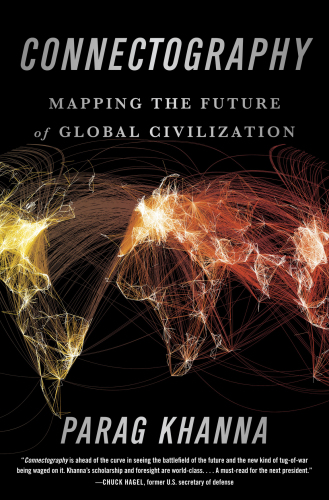
Connectography
Mapping the Future of Global Civilization
کتاب های مرتبط
- اطلاعات
- نقد و بررسی
- دیدگاه کاربران
نقد و بررسی

February 29, 2016
According to international relations expert Khanna (How to Run the World), the notion of geography as destiny is obsolete—a nation’s fate will be shaped not by where it’s located but
by who its partners are. States that excel at networking will grow and prosper. Already, Russia and China are building supply chains with the developing world by offering technology and infrastructure in return for access and raw materials. Dubai has rapidly achieved equal status with traditional international hubs like London and New York City. Khanna’s insights are at once self-evident and revelatory. Why conquer when you can seduce? However, he demonstrates limits to the power of modern checkbook diplomacy—violent protests in African nations against China’s heavy economic involvement are on the rise. Khanna argues that an interdependent world will see fewer wars over access and resources. His seemingly inexhaustible expertise about the global economy is impressive, but readers may feel as if they are on a supersonic non-stop flight to international hot spots, complete with jet lag. This is a prescient guide to the geopolitics of today and tomorrow. Agent: Jennifer Joel, ICM.

February 15, 2016
Global strategist Khanna (Asia and Globalization/National Univ. of Singapore; How to Run the World: Charting a Course to the Next Renaissance, 2011, etc.) analyzes the new world of global connectivity.Take what you think you know about globalization. Now add steroids. No ocean or continent goes untouched in the author's version of how human life is organized on Earth. We are headed, he insists, for a supply-chain world where, following the ancient law of supply and demand, ever expanding infrastructures of all varieties (including Internet cables) will channel commerce and talent, binding us culturally and economically ever more closely, obscuring if not entirely eliminating national boundaries. In the endless struggle for leverage, "the supply chain tug-of-war," ideology takes a back seat to commerce, and connectivity becomes paramount. A twin dynamic propels these infrastructure connections: first comes devolution, the fragmentation of territory into ever smaller units of authority (think the Soviet Union), and then, aggregation, the coming together of those units into something larger (think the European Union). A well-traveled, well-informed guide, Khanna makes persuasive use of pointed facts, surprising detail, and intriguing queries to demonstrate the degree of hyperconnectivity already upon us. Quick, can you say with any certainty where the car you drive was "made?" Did you know today's most visited city is Dubai or that by 2025 over 40 cities will have populations of more than 10 million people? That China has only one aircraft carrier but maintains the world's largest merchant marine fleet? That Canada's water may be more valuable than oil in the 21st century? Khanna's arguments range from a stout defense of the notion of "global citizens" to the futility of freezing today's political map, the virtues of reciprocity over protectionism, and the degree of foreign investment between two nations as the strongest predictor of stable relations. A consistently interesting, almost wholly persuasive vision of a future in which flow prevails over friction, where globalization's new "scale, depth, and intensity" reshape the map we thought we knew.
COPYRIGHT(2016) Kirkus Reviews, ALL RIGHTS RESERVED.

























دیدگاه کاربران